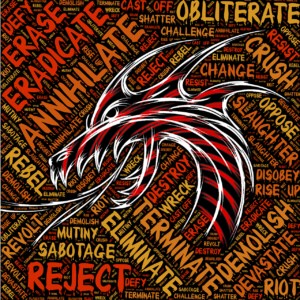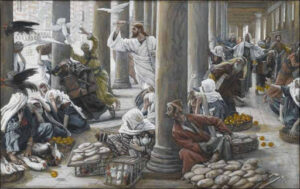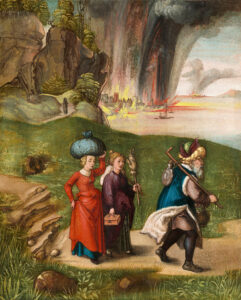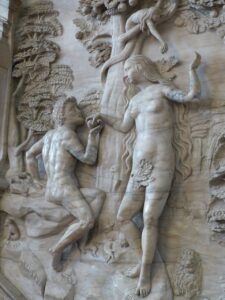 The year 20211It is now 2025, and censorship on a global basis is only getting worse. So is the world’s godlessness! is off with loads of controversies already. One major issue is the growing censorship of dissent regarding policies from a new, more liberal administration now in power. The Apostle Paul states:
The year 20211It is now 2025, and censorship on a global basis is only getting worse. So is the world’s godlessness! is off with loads of controversies already. One major issue is the growing censorship of dissent regarding policies from a new, more liberal administration now in power. The Apostle Paul states:
(Romans 1:18-22)2NIV New International Version Translations – “The wrath of God is being revealed from heaven against all the godlessness and wickedness of people, who suppress the truth by their wickedness, since what may be known about God is plain to them, because God has made it plain to them. For since the creation of the world God’s invisible qualities—his eternal power and divine nature—have been clearly seen, being understood from what has been made, so that people are without excuse. For although they knew God, they neither glorified him as God nor gave thanks to him, but their thinking became futile and their foolish hearts were darkened.”
The apostle explains that the Wrath of God is brought about by the godlessness and wickedness of people who suppress the truth. This tragic aspect of our world today is caused by the attitudes of those in power and the actions that follow their directives. Notice the order, godlessness, and then wickedness. Godlessness is not necessarily atheism, the belief that God does not exist. Godlessness is acting as though He does not exist. Our world today, including much of the Christian world, does not necessarily deny that there is a God, but it seems that they never take any account of Him. Why do people disregard God and expect no consequences? Paul says it is because the truth is suppressed. It is important to note here that while the truth described here includes God’s Truth, Paul is talking about all truth. What has taken the place of truth in our lives is the justification of what is ungodly and unrighteous.
- By ignoring what God has already revealed to us, the design and order of the universe.
- Implying that humankind’s intelligence is the same or greater than our Creator.
- Not being thankful, being ungrateful to God.
There are also consequences of not glorifying God. Modern humans have their own idols, such as secular humanism (worshipping self), covetousness (worshipping money), and worshiping creation (worshipping the environment), to name just a few. When humankind ceases to be thankful to God and regards created things over Him, God gets angry! Ignoring His Laws is another good way to get on God’s wrong side. God is pleased when we love and care for each other, when we are faithful stewards of His gifts to us, including the very world and people who live in it.
Truth from God is breaking out all around us, but we are busy covering it up, hiding it, suppressing it, keeping it from being prominent and dominant in our thinking. Worse yet, some are perverting the truth for self-interest. The reason life has turned tragic in so many cases is that the world is deprived of the truth necessary for life, liberty, and, most importantly, godliness. Censoring the truth that exposes the existence of a God of eternal power and majesty, and the consequences of unrighteous behavior, places all humanity at risk.
How has God made truth plain? The Scriptures clearly say that God has revealed Himself to man. Truth is not a vague, invisible, or even a difficult thing to comprehend; it is clearly seen. God himself has ensured that to be true. How? God can be seen in that which is made, through His creation. From the creation of the world, it was visible, and He has been present always and everywhere in our history. No one is left out. All can see this revelation of God if they choose to. This argument from the design and order of creation has never been rebutted. This is known to us because God is in our history, in the good history, and in what some may call the bad history. To censor history destroys its value as a moral compass for humanity.
Yet with all this discourse, there is one other overwhelming rational reason why censorship should not be tolerated. It is called the First Amendment of the Bill of Rights. It states:
“Congress shall make no law respecting an establishment of religion or prohibiting the free exercise thereof; or abridging the freedom of speech, or of the press; or the right of the people peaceably to assemble, and to petition the government for a redress of grievances.”
The ancient Greeks pioneered free speech as a democratic principle. The ancient Greek word “parrhesia” means “free speech,” or “to speak candidly.” The term first appeared in Greek literature around the end of the fifth century BC. During the classical period, parrhesia became a fundamental part of Athenian democracy. Leaders, philosophers, playwrights, and everyday Athenians were free to openly discuss politics and religion and to criticize the government in some settings.
The First Amendment of our Bill of Rights guarantees freedom of speech. Freedom of speech gives every American the right to express themselves without government interference. Most of the world does not have this right. It is the most basic component of freedom of expression. It is explicitly linked with the freedom of religion for a reason. Censorship, among other things, often attempts to mute the righteous. Included in the First Amendment is also freedom of the press. This freedom is like freedom of speech in that it allows people to express themselves through publication. There are certain limits to freedom of the press. False or defamatory statements, called libel, are not protected under the First Amendment. Libel is a statement or representation published without just cause and tending to expose another to public contempt or the publication of blasphemous, treasonable, seditious, or obscene writings or pictures.
The danger with libel is that it leaves it to others to set the standards of harm. It should never be a secret group of fact-checkers who determine the merits of anyone’s statement based on their own bias. We can, with full protection of law, worship our God, orally and in writing. Every Christian should be reminded that Christ was sentenced to death as a blasphemer. It was nothing more than a select group of fact-checkers that passed judgment on God Himself and had Him crucified.
The founders of the United States believed that mankind has certain “inalienable rights” including life, liberty, and the pursuit of happiness. Under that umbrella of liberty falls freedom of speech. Thomas Jefferson spoke of these rights as being endowed to man by his Creator; he called the right to liberty “inherent” and postulated that governments are instituted to allow man (the governed) to secure those rights and to pursue them freely. The liberty and consent of the governed were, in Jefferson’s mind, imperative for governments to be efficient and beneficial.
Witnessing censorship today is due to a divided population. When one group exposes the unrighteous actions of others, division ensues. Power corrupts, and absolute power (and wealth) corrupts absolutely. Despite the unfairness of the actions we see today, Godly people are being called to stand firm. World history has shown that the loss of free speech and freedom of religion is a precursor to the loss of all other freedoms. There is a reason why our founding fathers made it the “First Amendment.” Like Christ, the First Amendment is the cornerstone of the eternal universe.
(Ephesians 2:19-22) – “Consequently, you are no longer foreigners and strangers, but fellow citizens with God’s people and also members of his household, built on the foundation of the apostles and prophets, with Christ Jesus himself as the chief cornerstone. In him the whole building is joined together and rises to become a holy temple in the Lord. And in him you too are being built together to become a dwelling in which God lives by his Spirit.”
Our ultimate freedom is found in belonging to Christ (Galatians 5:1; 2 Corinthians 3:17). Sin brings bondage (Romans 7:14), but the one who belongs to Christ is spiritually free (Romans 8:2). Speaking the truth in love is a biblical mandate (Ephesians 4:15). Therefore, any government law that guarantees citizens the right to speak the truth aligns with godly principles. By the same token, any law that suppresses a person’s right to speak the truth is working against God’s command. Freedom of speech does not guarantee that truth will be told, but it does permit it to be told.
Contemplations
- Why do people tolerate censorship on social media?
- Ideas to Explore: It depends on which side’s opinions are being censored. Social Media is too convenient to give up. It is too much work to check multiple sources of information. Are the media and the Internet trustworthy platforms?
- How do you personally get to know the leaders of our country?
- Ideas to Explore: Are you politically active? Always do what your family does. Spend time doing research? You like to personally meet people and see what they are about.
- Where do you think that the control of information has gone too far?
- Ideas to Explore: Shutting down social media accounts. Demanding camps reprogram the beliefs of those who disagree with their agenda. Spying on people via phones and emails. Shuttering media companies that have an alternative message?
- Is privacy—the control of your information at risk these days?
- Ideas to Explore: Use of free email services and who can read what you write. Google, etc., tracks searches to develop profiles of you. Tracking your every movement by location data in your cell phone. Do you worry about what information is being collected on you and the conclusions that some unknown group is drawing?
- What should we do when pressed to act ungodly?
- Ideas to Explore: The government forces people to support causes or regulations that conflict with their faith. Banning products or companies that believe differently. How does a person reconcile their oath to their country against their oath to God?
- 1It is now 2025, and censorship on a global basis is only getting worse. So is the world’s godlessness!
- 2NIV New International Version Translations








